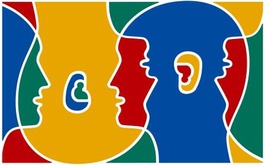
English as lingua franca? Outvoted!
Published on
Translation by:
 Jack Cater
Jack Cater
It will soon be that time again: 26th September is the European Day of Languages. The EU celebrates multilingualism to break down language barriers, even though the suggestion of a lingua franca arises again and again. Yet linguistic diversity is one of the political trademarks of Europe.
Like every year, on 26th September the EU, together with the Council of Europe, prepares to celebrate the European Day of Languages, the linguistic diversity of Europe and the multilingualism of its citizens. Meanwhile, the issue of the need for a common language is raised again on Debating Europe, the platform for Europe-related debates.
Since the start of September, the question “can a European identity exist without a common language” – or rather, without a lingua franca for the EU – has been discussed eagerly online. Is such a debate really still useful?
Contradictions which are not really contradictions
The language policy of the EU, agreed by all member states in Barcelona in 2002, leaves no room for doubt that a common European identity is based on multilingualism and linguistic diversity.
A contradiction in itself, you could say. The idea is actually anything but contradictory: educated Europeans can speak and write at least two foreign languages, but buy their bread each morning in their own language – this is precisely what is conveyed pithily by the EU motto “united in diversity”.
In other words: through the recognition of the cultural specifics of other languages and the difference of one’s native language, a common European identity is created and a common identity is maintained. There seems to be nothing wrong with this concept. Why then the laborious issue of the need for a common language?
English as the lingua franca of the EU
Debating Europe refers to a survey from 2012 in which 67% of participants felt that English is a useful language, whereas 38% of young people within the EU between the ages of 18 and 25 speak English as a foreign language. In a further survey in 2014, it emerged that 61% of participants see themselves as EU citizens.
So it really does seem as though a common language is not necessary for the creation of a common identity. However, should you choose a lingua franca for this – or any other – reason, then in all probability the choice would be English.
... and yet not a lingua franca
If English were to officially assume the role of lingua franca, this would have a negative impact on the English language itself. This is shown by the European Commission’s CORDIS report from 2011 titled “Lingua Franca: Chimera or Reality?” Comprehensibility, communicative flexibility and efficiency would become more important than being correct to native speaker standards. The English language would suffer due to this.
Even worse is the fact that “the academic and cultural achievements and traditions of Europeans, which are preserved in their various languages, would dwindle away little by little with a universal language”, according to the former President of the European Federation of National Institutions for Language, Gerhard Stickel, in an interview with the Goethe-Institut in 2006.
Shared linguistic diversity
It is not necessary to forego linguistic diversity in order to break down language barriers. These can easily be removed through targeted and funded education. Germany is an example of this. Talent and enthusiasm for learning also have a role to play.
The German ‘Bundeswettbewerb Fremdsprachen’ (National Foreign Language Competition), supported each year by the German Federal Ministry of Education and Research, gives young people the opportunity to test a variety of language skills. Every foreign language taught in German schools counts as a competition language. Ancient languages such as Latin and Ancient Greek also count. Only artificial or planned languages like Esperanto or Klingon are not allowed in the competition.
Rightly so? Nowadays, language is more than the verbalisation of pictograms. Languages should in fact communicate culturally-determined, varied, lively realities. And this is what is celebrated on 26th September.
Translated from Englisch als Lingua Franca? Abgewählt!


